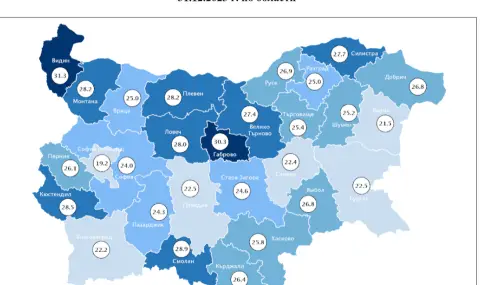As of December 31, 2023 . the population of Bulgaria is 6,445,481, which represents 1.4% of the population of the European Union. Compared to 2022, the country's population decreases by 2,229 people, or by 0.03%. The interesting fact is that according to the CEC, the number of voters (Bulgarian citizens who have reached the age of majority) is 6,594,593 people.
Men are 3,097,698 (48.1%), and women - 3,347,783 (51.9%), or 1,081 women per 1,000 men. The number of men predominates in the age group up to 55 years. With increasing age, the number and relative share of women in the total population of the country increases. This is shown by the latest NSI data published today.
At the end of 2023, there are 1,530,909 persons aged 65 and over, or 23.8% of the country's population. Compared to 2022, the share of the population in this age group increased by 0.3 percentage points.
The relative share of women over the age of 65 is 27.7%, and of men - 19.5%. This difference is due to the higher mortality among men and, as a consequence, to their lower average life expectancy.
In a regional aspect, the share of persons aged 65 and over is highest in the districts of Vidin (31.3%), Gabrovo (30.3%) and Smolyan (28.9%). In total, in twenty-two districts, this share is above the national average. The share of the elderly population is the lowest in the regions of Sofia (the capital) - 19.2%, Varna - 21.5%, and Blagoevgrad - 22.2%.
Total for the EU-27, the relative share of the population aged 65 and over is 21.3%. This share is highest in Italy (24.0%) and Portugal (24.0%). In total, in seventeen countries, including Bulgaria, the share of the elderly population is over 20.0%.
As of 31.12.2023, there are 911,025 children under the age of 15 in the country, or 14.1% of the total population.
The relative share of the population under 15 years of age is highest in the districts of Sliven - 18.9%, Yambol - 15.2%, and Burgas - 14.9% of the district's population. In a total of seventeen districts, this share is below the national average, the lowest being in the districts of Smolyan - 10.6%, Vidin - 11.5%, and Gabrovo - 11.7%.
In 2022, the share of the youngest population in the EU-27 is 14.9%, with the lowest in Italy - 12.4%, Portugal - 12.9%, and Malta - 12.7%, and the highest in Ireland - 19.3%, Sweden - 17.4%, and France - 17.3%.
As of 31.12.2023, the total age dependency ratio in Bulgaria is 61.0%, or for each person in the dependent age group (under 15 and over 65 years) there are less than two persons in active age. This ratio is more favorable in cities - 57.6% than in villages - 71.3%. In all regions of the country, this indicator is over 50.0%. The lowest value of the coefficient is in Sofia (the capital) - 51.5%, and the most unfavorable ratio is in the districts of Vidin - 74.8%, and Gabrovo and Yambol - 72.3% in each.
The aging of the population over the years leads to an increase in its average age, which increased from 40.6 years in 2002 to 45.2 years at the end of 2023. The average age of the population in cities is 44.4 years, and in villages - 47.5 years.
The population of working age as of 31.12.2023 is 3,769 thousand people, or 58.5% of the country's population, with 1,971 thousand men and 1,798 thousand women.
By the end of 2023, there are 1,698 thousand people above working age, or 26.3%, and 977 thousand people, or 15.2% of the country's population, below working age.
